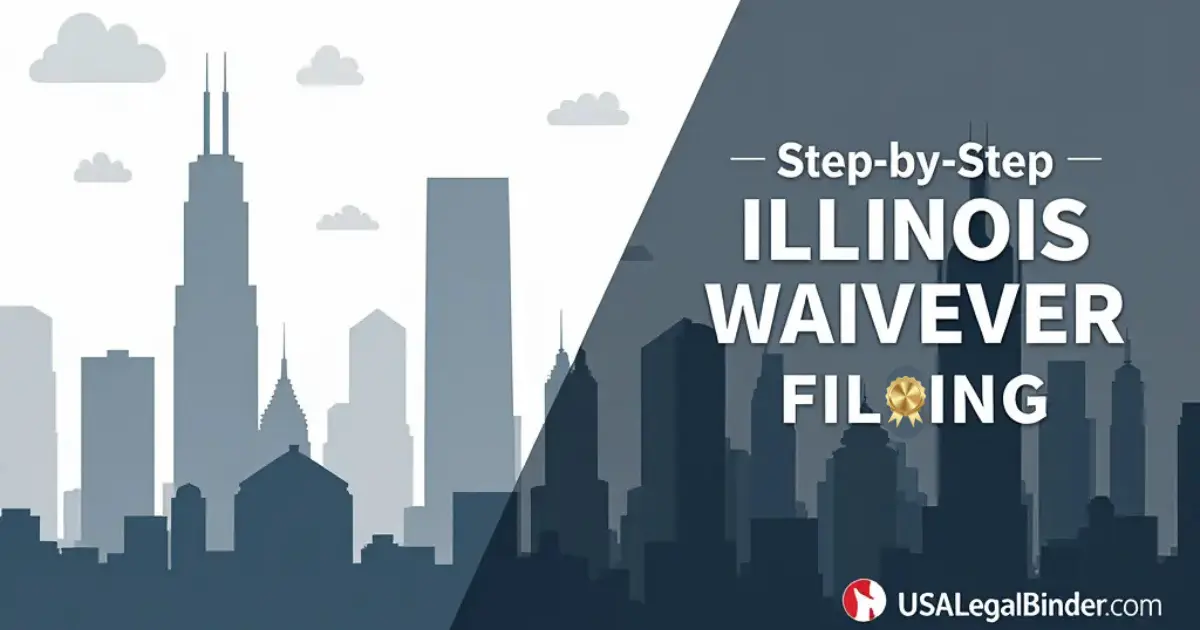Illinois Waiver Filing — If you cannot afford court costs in Illinois, filing a waiver can prevent dismissal and remove financial barriers. This guide explains Illinois-specific eligibility rules, the exact forms you may need, and a clear step-by-step process to submit your waiver correctly.
The instructions below are tailored to Illinois courts and administrative procedures. Read each section, collect supporting documents, and use the official links provided to download current court forms.
Quick Overview / What this Illinois Waiver Filing covers
In Illinois, a waiver typically refers to a petition to proceed in forma pauperis or an indigency petition that asks a court to waive filing fees, transcript fees, or appeal bonds due to financial hardship.
Common relief available through a waiver in Illinois includes:
- Forgiving initial filing fees for civil, family, or probate matters.
- Waiving fees for service, copies, and certified transcripts when necessary.
- Requesting waiver or reduction of appeal bonds based on indigency.
State-specific Requirements (Illinois Waiver Filing)
Illinois courts apply state statutes, Supreme Court rules, and county procedures when evaluating waiver requests. Familiarize yourself with the Illinois Supreme Court Rules and local clerk instructions before filing.
Key Illinois agencies and resources:
Jurisdiction and residency: file the waiver in the Illinois county where your case is pending. Judges consider household income, assets, and essential expenses in line with Illinois standards when assessing indigency.
Who typically qualifies in Illinois
- Individuals receiving means-tested public benefits (e.g., SNAP or Medicaid) are strong candidates for fee relief.
- Low-income households with unavoidable expenses (medical bills, housing) may qualify based on documented hardship.
- Incarcerated persons seeking in forma pauperis status for appeals follow a specific Illinois Waiver Filing procedure.
Step-by-step How to Complete & Submit
Use this practical checklist to complete an Illinois Waiver Filing accurately.
- Locate the correct form. Visit the Illinois Courts website or your county clerk’s page to find the in forma pauperis or indigency form used in your county.
- Gather supporting documents. Collect recent pay stubs, public benefit letters, a recent bank statement, and government ID to support your statement of inability to pay.
- Fill out the affidavit accurately. Provide case number, court name, household members, income, expenses, and any extraordinary costs (medical, childcare).
- Sign under oath. Many Illinois forms require a sworn statement under penalty of perjury; follow the signature and notarization instructions on the form.
- Attach documentation. Include photocopies of benefits notices, pay stubs, or other documents that corroborate your claim.
- File with the clerk. Submit the completed form and attachments in person, by mail, or via e-filing if your county supports electronic filing. Request a stamped copy for your records.
- Follow up on any court orders. The judge may grant, deny, or request a hearing; respond quickly and provide any additional evidence requested.
Prepare the following items Illinois Waiver Filing:
- County-specific indigency affidavit or Illinois in forma pauperis form (check your county clerk’s site for exact filename).
- Proof of public benefits (Medicaid, SNAP, TANF) or award letters.
- Recent pay stubs (last 2-4 pay periods) or employer statement.
- Bank statements or proof of assets if requested by the court.
- Valid Illinois ID (driver’s license or state ID) and copies of case pleadings.
Note: Some Illinois counties provide online checklists or local affidavits—always confirm the current form version at the official county clerk website.
Processing Time, Fees and Deadlines Illinois Waiver Filing
Filing the waiver form is free, but processing times and procedures vary across Illinois counties and court levels.
- Processing time: Clerks usually forward indigency forms to a judge within days; resolution may take from a few days to several weeks depending on caseload.
- Fees: There is no charge to file the waiver itself. If a waiver is denied, you remain responsible for filing fees, service costs, and any appeal bonds.
- Deadlines: File the waiver when you file your initial pleading or before an appellate deadline to avoid dismissal or loss of appeal rights.
Common Mistakes to Avoid Illinois Waiver Filing
- Using an outdated form—download the latest version from Illinois Courts or the county clerk’s site.
- Failing to attach supporting documents like benefit letters or pay stubs.
- Providing inconsistent income information across documents.
- Not including the correct case number, court name, or signature on the form.
- Failing to retain a stamped copy of the filed waiver as proof of submission.
Use only authoritative sources to download forms and read instructions:
FAQs
A: Use the in forma pauperis or county indigency affidavit available on the Illinois Courts site or your county clerk’s website; forms vary by county.
Q: Will a waiver be granted automatically in Illinois?
A: No. A judge will review your affidavit and supporting documents and may deny the waiver if the court finds you can reasonably pay.
Q: Can I request a waiver for an appeal bond?
A: Yes. Illinois allows indigency-based requests for appeal bonds; file the appropriate motion or affidavit before the appellate deadline.
Q: What happens if my waiver is denied?
A: You must pay the required fees to proceed. You can provide additional evidence, seek legal aid, or consult an attorney for options.
A: Contact your county clerk’s self-help desk, Illinois legal aid organizations, or university law clinics for assistance in filling forms and gathering documents.
Conclusion & Call to Action
Successfully completing a waiver Illinois filing requires the correct county form, truthful financial disclosures, and supporting documentation. Begin by locating your county’s indigency affidavit on the Illinois Courts website, collect proof of benefits or income, and file promptly to avoid delays.
For official forms and county contacts, visit the Illinois Courts site or the state portal at Illinois.gov. For related templates and resources, see USAlegalBinder.com or consult a qualified Illinois attorney for case-specific guidance.
